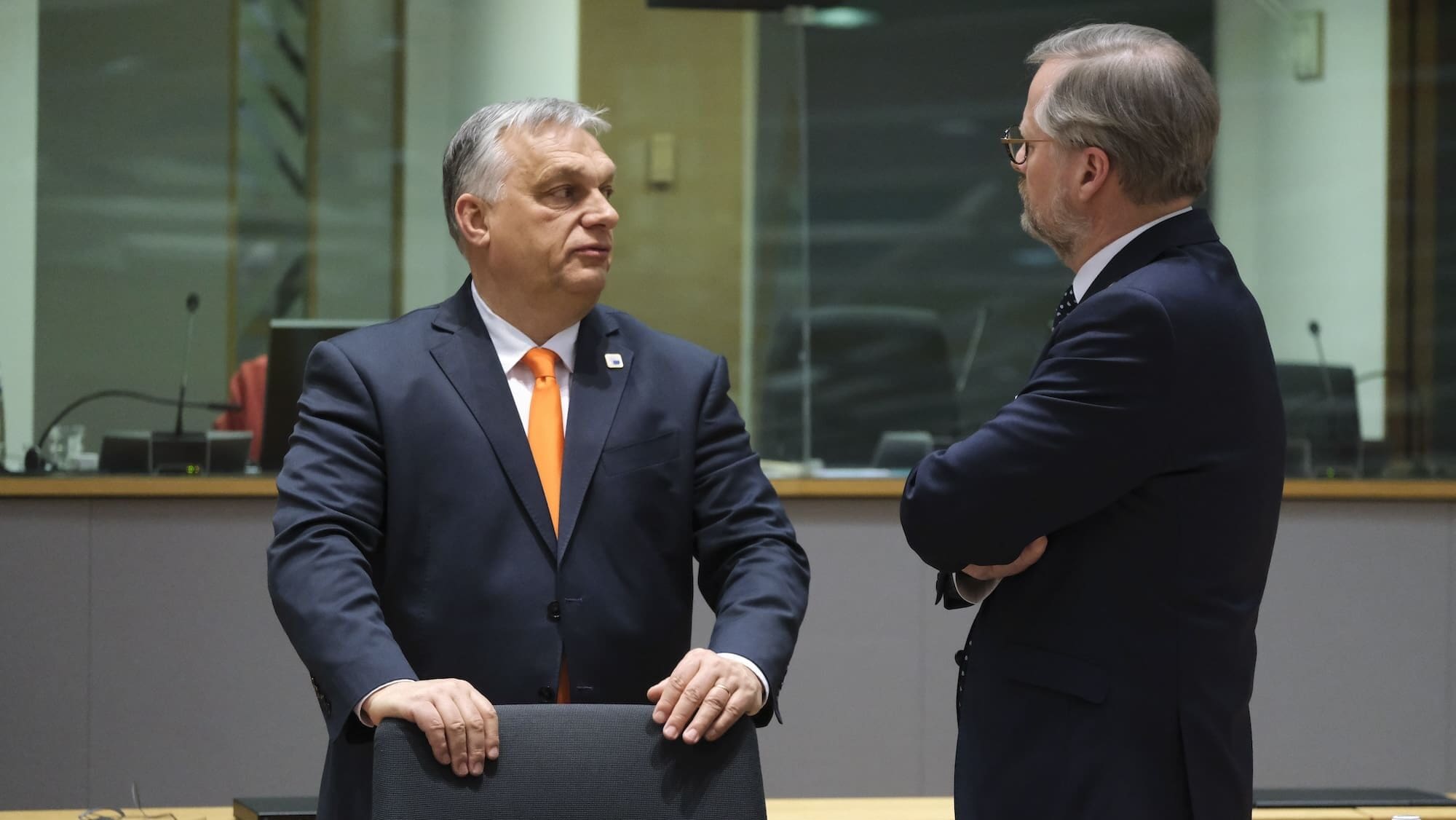
Hungarian PM Viktor Orbán (left) and Czech PM Petr Fiala.
Photo: © European Union
Parties across the EU began crunching numbers as soon as the election results were published. The center’s ‘Ursula coalition’ is interested in whether they can push von der Leyen through the finish line once again, while the national conservative forces are juggling different scenarios to make their parliamentary groups more powerful in the incoming European Parliament.
Once again, Hungarian Prime Minister Viktor Orbán publicly backed Marine Le Pen’s idea of merging the two sovereigntist blocs—her Identity and Democracy (ID) group and Giorgia Meloni’s European Conservative and Reformists (ECR)—saying that such an alliance would have the opportunity to become the second largest force in Brussels, rivaling von der Leyen’s European centrist People’s Party (EPP).
“If the two right-wing factions, the conservatives [ECR] and the Identity and Democracy [ID] group agree and we join them, they will be the second strongest force in the EP,” PM Orbán said in his first TV interview after the elections on Monday, June 10th.
Breaking: @PM_ViktorOrban to public media: if @ecrgroup & @IDGroupEP unite + we add @FideszEP, we can have the second largest group in the EP❗️ This group could attract MEPs also from the EPP. Everything depends on @GiorgiaMeloni and @MLP_officiel. We will know in a month if…
— Gát Ákos Bence (@BenceGat) June 10, 2024
The math checks out: ECR and ID both gained seats during the election and now have 131 between them; add to that the currently non-aligned Fidesz’ ten, and the national conservative ‘superbloc’ comfortably surpasses the social democrat S&D with its 135 seats as the second largest parliamentary group.
The implication would be profound, as the social democrats have never fallen to third place in EU history. S&D has been the second largest, after EPP, in every term since 1999 when the center-right overtook it. S&D had been leading the Parliament up until then since the first EP elections in 1979.
The hypothetical national conservative, sovereigntist superbloc—with at least 141 MEPs—would further increase the possibility for a right-wing majority in the Parliament, albeit there’s not much chance that the centrist, technocrat EPP would seek an alliance with parties that it has been relentlessly portraying as ‘far-right’—or worse.
Becoming a rival force to EPP is a much more possible approach, and one not too unrealistic either. There are a lot of national conservative parties who are still in the giant non-aligned camp trying to find a home, and no doubt, some of those could also be admitted in this joint venture. The German Alternative für Deutschland (AfD) is by far the biggest with 17 seats, but there’s also the Polish Konfederacja with six, the Bulgarian Revival with three, or a handful of others with one or two seats which, if combined, could put the bloc at 160-170 MEPs—dangerously close to EPP’s 186.
Of course, there are parties in ECR who don’t like the idea of becoming one camp with ID—as if their legitimacy depends on having another group to the right of them—and instead would like to seek out a deal with von der Leyen and the EPP. Italian PM Giorgia Meloni is still on the fence about which alliance would deliver her victorious Fratelli d’Italia the best results, but others, like Czech PM Petr Fiala, seemed to have already decided on the path toward the mainstream.
“If there are further shifts, we have to consider what we will do. For me, being in the same group as radical political forces is unacceptable,” Fiala, the leader of the conservative Civic Democrats (ODS) told journalists on Monday, urging ECR to cooperate with EPP instead.
What Fiala probably hinted at has been the subject of months-long speculations, namely that he’s considering jumping ship and joining his two smaller coalition partners in EPP instead.
His departure would mean ECR loses a head of government in the European Council, but given that ODS only has three seats in the Parliament, it wouldn’t hurt the bloc that much. Besides, Fiala’s biggest domestic challenger, the populist ex-PM Andrej Babis’ ANO is also thinking of quitting the liberal Renew and bringing its 7 MEPs to the Right, possibly to ECR.
So, a little Czech reshuffle might leave the sovereigntists better off and open the door for the merger with ID—145 seats with ODS out, but Fidesz and ANO in—which would need Meloni’s approval.
